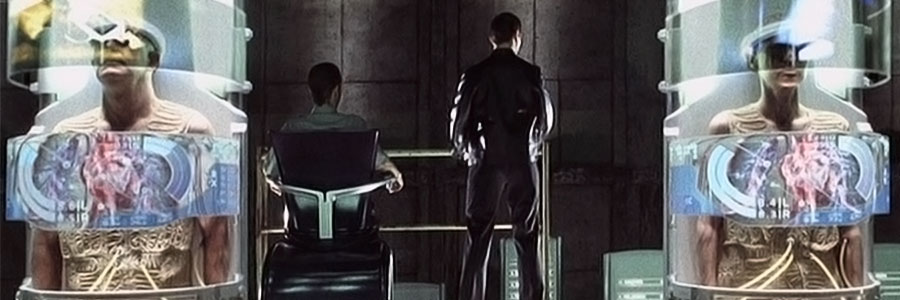
Minority Report
MINORITY REPORT
Twentieth Century Fox
Original release: June 17th, 2002
Running time: 139 minutes approx.
Director: Steven Spielberg
Writers: Philip K. Dick (Short story), Scott Frank
Cast: Tom Cruise, Max von Sydow, Colin Farrell, Samantha Morton
Deconstructing Cinema: One Scene At A Time, the complete series so far
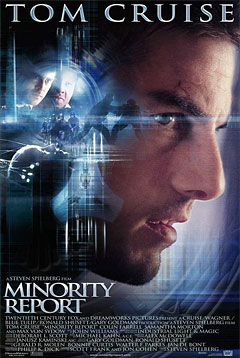
In the not so distant future, privacy will be a thing of the past. Not only the privacy that’s already being infringed upon by overzealous administrations, omnipresent surveillance and an otherwise emerging Big Brother society. It’s about our intimate privacy, our dreams and fears, desires and dislikes. The freedom of thoughts will disappear soon.
This is no science fiction, it’s science fact, or at least it’s fast evolving science fact.¹ We already live in a state where suspicion and paranoia seem to justify judgement. In a way, the “war on terror” has made it appear acceptable to arrest and detain whoever’s deemed a likely perpetrator. The actual benefits of an ever more intrusive legislation for Jane and John Doe remain in the dark, and so do the real beneficiaries — or do they?
Spielberg’s Minority Report, released just 10 months after 9/11, has unerringly predicted this kind of future with a neo-noir picture that to this day remains a masterpiece in multi-layered storytelling, with a subtle but complex subtext and an extreme emotional depth. Based on a short story by Philip K. Dick, the film’s set in the Washington, D.C. area in the year 2054. A specialised police force apprehends — potential — murderers based on the foreknowledge of three psychics, the so-called precogs.
This hightech unit, Precrime, is not without controversy though — despite having prevented any murder for six years, and throughout the story the justification for this kind of law enforcement is in doubt.
However, the opening scenes of the film lead us in a different direction. We’re taken on a psychic trip when the three precogs have an agonising vision of a betrayed husband slaughtering his unfaithful wife and her lover. 20 minutes later and apparently in the last second, Precrime’s chief John Anderton (Tom Cruise) overpowers the man and has him “haloed”, a painless but irrevocable form of subduing the would-be murderer. In all likelihood he will not come back from this “prison” — a kind of death sentence without execution – and trial.
We can’t help it but commend the rescuers and sympathise with Anderton who, as we later learn, has lost his son to a crime, too. What they do seems right. The man, 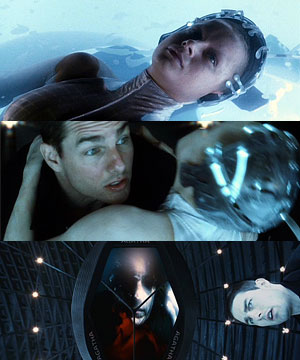 about to plunge a pair of scissors into his wife, had virtually been caught in the act. He would’ve been a murderer.
about to plunge a pair of scissors into his wife, had virtually been caught in the act. He would’ve been a murderer.
Although he believes in the system, Anderton soon realises something’s wrong. Agatha (Samantha Morton), one of the precogs, shows him a harrowing vision from the past asking him “Can you see?” Anderton, startled to his bones, is shown a murder that happened a long time ago and wants to investigate the crime but it turns out the records have disappeared. Suspecting a “glitch” at first, he discusses the incident with his boss, Lamar Burgess (Max von Sydow), with no prevail.
The next vision of the precogs turns the hunter Anderton into the hunted. The three predict he will murder a man he’s never met and to avoid being “haloed”, Anderton flees. To him, the prevision was faked. In an attempt to prove the precogs wrong he turns to the woman who invented Precrime, Iris Hineman (Lois Smith).
This scene not only reveals the back story of the Precrime division and its tragic beginnings, we also see Anderton’s world fall to pieces. At the same time Spielberg asks questions that pull the future world of Precrime right back into the present.
If the unintended consequences of a series of genetic mistakes and science gone haywire can be called invention, then yes, I invented precrime.
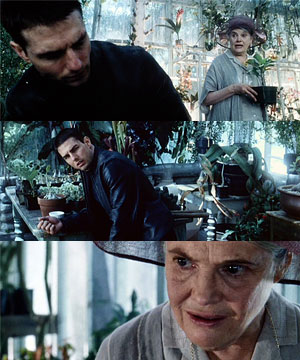 ANDERTON
ANDERTON
You don’t seem all that proud.
IRIS
I’m not. I was trying to heal them, not turn them into something else.
ANDERTON
Heal who?
IRIS
The innocents we now use to stop the guilty.
ANDERTON
You’re talking about the precogs…
IRIS
You think the three in the tank come out of a test tube? They’re merely the ones who survived. I was doing genetic research at the Woodhaven Clinic treating children of drug addicts… All of these kids were born with severe brain damage, most died before the age of 12. Those few, those precious few who survived… They had a gift, I call it a gift, for them it was more like a cosmic joke… When these little children closed their eyes at night, they dreamt only of murder, over and over, one after the other, and it didn’t take long for us to realize that the real nightmare was that these so-called dreams were about to come true, these murders were actually happening.
ANDERTON
You say some of the children died.
IRIS
So many of them… despite what we did for them. Or maybe because of what we did to them. But it doesn’t matter. It’s a perfect system now, isn’t it?”
Beyond the obvious theme of “free will versus determinism”, Minority Report is also about an attitude of “the end justifies the means”, where even human rights are at the disposal of a true or ostensible “greater good”. Not least the precogs themselves, always submerged in a floating tank, apparently never had a say in their fate and as Anderton himself says at some point, we “shouldn’t think of them as human beings”.
Ultimately though Anderton has no choice and must realize his belief in the system is built on sand, and the woman who “invented” the system can’t exonerate him either.
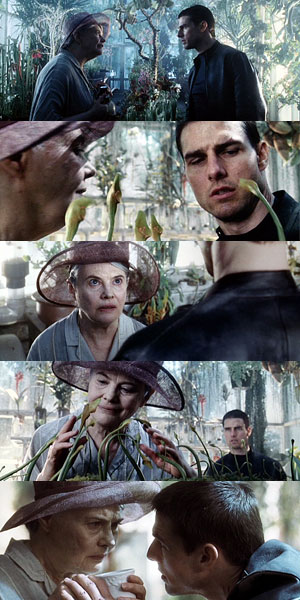
No one can. The precogs are never wrong… But, occasionally, they do disagree.
ANDERTON
What?
IRIS
Most of the time, all three precognitives will see an event in the same way. But once in a while, one of them will see things differently than the other two.
ANDERTON
Jesus Christ – why didn’t I know about this?
IRIS
Because these Minority Reports are destroyed the instant they occur.
ANDERTON
Why?
IRIS
Obviously, for Precrime to function, there can’t be any suggestion of fallibility. After all, who wants a justice system that instils doubt? It may be reasonable, but it’s still doubt.
ANDERTON
Are you saying that I’ve haloed innocent people?
IRIS
I’m saying that every so often those accused of a precrime might, just might, have an alternate future…
Don’t trust anyone. Just find the Minority Report.”
Anderton’s ensuing quest is not only a gripping whodunit story, it also forces the man to look deep inside himself. Spielberg intertwines one of his major themes, broken families, with an exploration of psychic abilities. Anderton, on the run with the precog Agatha, relies on her short-term predictions to avoid capture but through her he also discovers truths about himself.
In the end, the whole system unravels and the final twist reveals the futility of a technology that’s based on human misconceptions, and the seemingly unsolvable predicament that anything can be both used and abused. As Spielberg unfolds a deeply human disaster amidst a compelling and seamless hightech world, the consequences of a spiritually and morally immature — collective — mind appear particularly severe. A truly “brave new world” may just be an illusion even if technology allows something like practical telepathy.
- (1) Mind reading is possible! (Salon.com)
- (1) Precog-Like Software Tested (Mashable)
- (1) Why Minority Report was spot on (The Guardian)
- (1) Minority Report becomes reality: New software that predicts when laws are about to be broken
- (2) Dean A. Kowalski in Steven Spielberg and Philosophy: We’re Gonna Need a Bigger Book, p. 227, The University Press of Kentucky, 2011
- (3) The Brain Supremacy: Notes from the Frontiers of Neuroscience, Oxford University Press, 2012
For now. No one knows how close a future is where it’s not. There’ll always be “minority reports” and without checks and balances any technology to hijack someone else’s mind is either doomed or open to manipulation. Whether or not they exist, psychic abilities are still a matter of fringe science and ridicule for a reason.
In the final scenes of Minority Report, we see the three precogs living in the middle of nowhere, in a simple farm house with books, and free of technology. Many have disliked this “happy ending” as it seems to break the style of the film, but I think it’s actually a trenchant statement. Try as we might, we can keep psychics far from civilization but in the end, technology might just do their job. Technology though might not be capable of producing “minority reports”…
As government investigator Witwer says earlier in the film, “the power has always been with the priests, even if they had to invent the oracle.”
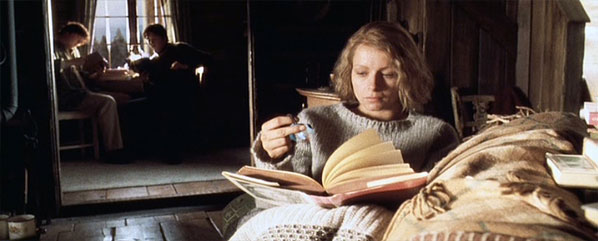

Jonahh Oestreich
One of the Editors in Chief and our webmaster, Jonahh has been working in the media industry for over 20 years, mainly in television, design and art. As a boy, he made his first short film with an 8mm camera and the help of his father. His obsession with (moving) images and stories hasn’t faded since.
You can follow Jonahh on Twitter @Jonahh_O.
© 2022 STATIC MASS EMPORIUM . All Rights Reserved. Powered by METATEMPUS | creative.timeless.personal. | DISCLAIMER, TERMS & CONDITIONS
HOME | ABOUT | CONTACT | TWITTER | GOOGLE+ | FACEBOOK | TUMBLR | YOUTUBE | RSS FEED
CINEMA REVIEWS | BLU-RAY & DVD | THE EMPORIUM | DOCUMENTARIES | WORLD CINEMA | CULT MOVIES | INDIAN CINEMA | EARLY CINEMA
MOVIE CLASSICS | DECONSTRUCTING CINEMA | SOUNDTRACKS | INTERVIEWS | THE DIRECTOR’S CHAIR | JAPANESE CINEMA





